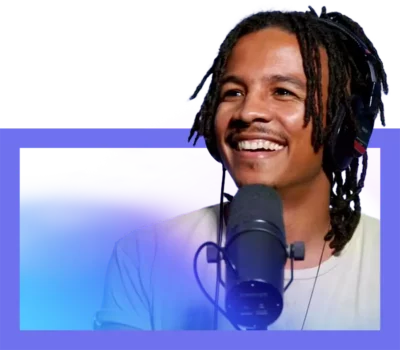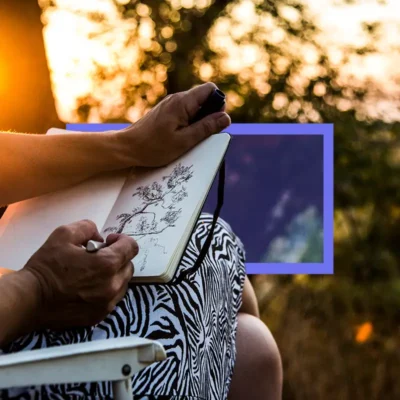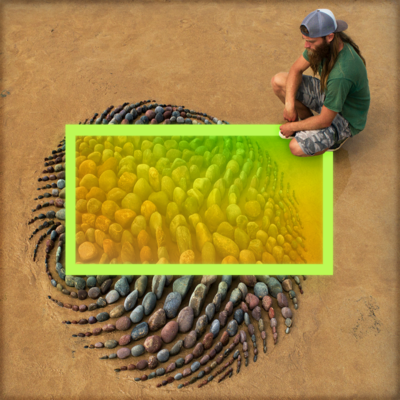Finding my flow state
Like so many of us, Chad Sanders has strived to belong for as long as he can remember — thwarted in the shadows of other people’s judgements of him. Fortunately, life has its way of giving us glimpses into our limitless possibility, when we allow our natural creativity and curiosity to embody our highest expression, regardless of the friction that people and circumstances place upon us. A magical high school experience in English class, and later in life, an auspicious walk with the iconic filmmaker, Spike Lee, give Chad unforgettable windows to find his flow. Turns out, by letting go of how others think he should be, Chad is finally able to walk into every room and every environment as himself.
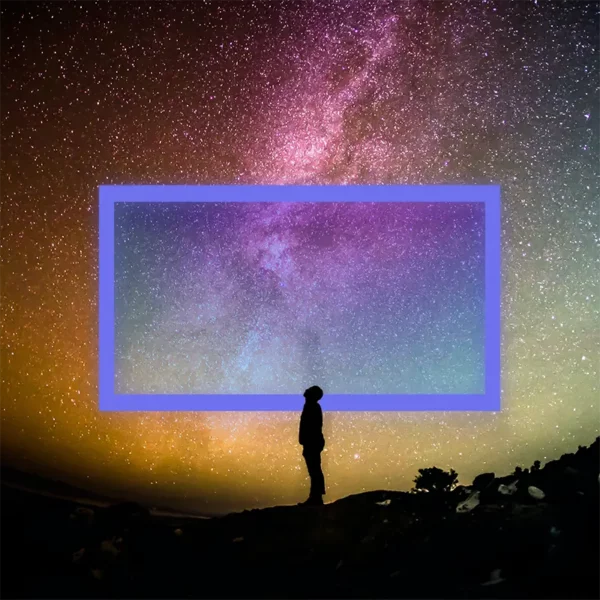
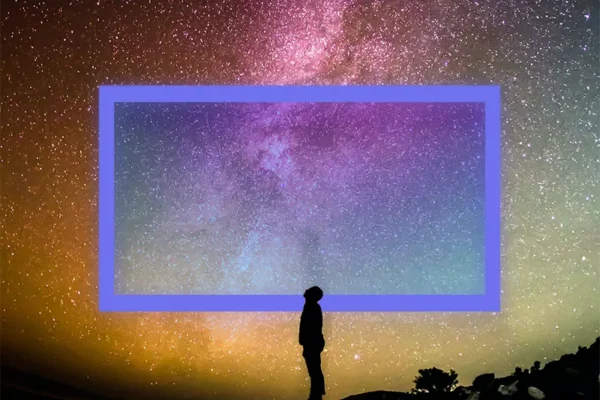
Table of Contents:
Transcript:
Finding my flow state
CHAD SANDERS: When I’m here, the friction goes away. English class is the one place where I feel like I’m in orbit, I’m in space. I’m like a fish in water. As I put down my own thoughts and ideas, everything slows down for me. I feel things. I just get it.
ROHAN GUNATILLAKE: As a student, Chad Sanders often felt like a fish out of water — except in one magical, creative classroom, where he found his sense of belonging and flow. As he starts climbing the corporate ladder, though, that fish-out-of-water feeling comes back in force; he sees the hierarchies and ingrown systems around him adding friction to every step he takes. He realizes he needs to do something bold to regain the pure creativity, the curiosity, that lets him walk without friction and unabashedly be himself.
In this series, we combine immersive first-person stories, breathtaking music, and mindfulness prompts so that we may see our lives reflected back to us in other people’s stories. And that can lead to improvements in our own inner lives.
From WaitWhat, this is Meditative Story. I’m Rohan, and I’ll be your guide.
The body relaxed. The body breathing. Your senses open. Your mind open. Meeting the world.
SANDERS: The sun is out. The sky is blue. Small white clouds sit in the sky like they are up there smiling over Brooklyn. And I’m smiling too. I’m taking a three-block walk with my new mentor, film director Spike Lee.
All over the Fort Greene promenade, people recognize him: the Yankees cap, the trim beard, Jordans on his feet, thick framed glasses, the bracelets, the earrings adorning his ears and wrists. It’s Spike. People say hi as he passes, some people wave. He gives them the time of day, but he’s walking.
Spike leans forward, like he has a fish-hook in his forehead. It’s like he’s being pulled by something. He walks like this everywhere. It’s his walk. He moves with authority. He moves like he’s ordained to say: “This is how it goes.”
Spike is all wiry and coiled, like a cricket. He’s sixty-ish. I’m only 28, but I have a hard time keeping up with his pace. He doesn’t seem to feel the urge to make sure everybody’s comfortable, or that he’s not going too fast. It’s clear he’s going to get where he’s going as quickly as possible on his own two feet — anybody who can’t keep up, anybody who’s in the way be damned.
With every step that Spike takes he seems to melt away any friction. I watch closely how he is just so clearly, unabashedly himself.
We take a left and another quick left. We’re scouting an arresting church for his new movie. Well, he’s scouting. I’m learning how to scout. He’s looking for locations for the movie that he’ll shoot in a few months. That screenplay is the first Spike gives me to read. As we turn onto the tree-lined street, the brown stone tower looms overhead. The structure feels ancient, like it’s been here since before the Dutch landed. From the outside, I can just make out the figures on the stained glass: Jesus on the cross, Mary with her baby.
My mind drifts back to the ninth grade, a time when I was anyone but myself.
The private school I’m attending in Washington, DC, has a full-on chapel, with stained-glass windows and figures of Jesus hanging from the walls. Everything here feels different from the public schools I’ve attended since kindergarten.
To my 13-year-old eyes, the most obvious difference is the clothes. Here, there are uniforms: white polo shirts with the school crest and nice, ironed, crisp pants. And the dress shoes: they all look the same to me, just black leather. But these boys take their shoes seriously.
The only time my good friend Brad ever gets mad at me is when I forget to bring in his dress shoes that he left at my house. Coming to school without them is a social miscue that I don’t fully understand. He can’t exactly explain to me why the shoes are so important, but he really wants those shoes.
Many kids at the school have a talent in pulling off the uniform in a way that always looks crisp. I can tell by the way they look at me that I’m doing something wrong, but I don’t know what.
One day of the semester we’re allowed to accent our uniforms by wearing whatever belt we want and whatever shoes we want. So I pull on my sneakers — they’re off-brand Jordans — and this multicolored, rastafarian woven belt that I bought at a kiosk in Wheaton Mall. I’m pretty pleased with myself.
But as I walk down the corridors with the shiny floors and the glaring overhead lights nothing I do seems right. I pass students I know, and I nod. They just look at my shoes. They’re staring. They make faces. They smirk. Every day I’m reminded, in some way or another, that I’m not good enough, not on the basketball court, not in the hallways, not in my home address. Hell, I’m only 13. But it’s like they’re all saying, “You don’t matter here. You definitely don’t fit in here.”
For the first time in my life I’m seeing hierarchies, and I’m seeing my place in them. I live in an unfashionable suburb, and my parents aren’t politicians or socialites. I don’t like the fact that I’m being ranked. It weighs me down. It distracts me. I want to resist, but I just don’t know how.
GUNATILLAKE: This is a challenging moment for Chad. The confusion, the closing off body language. There are forces at play in each of our lives that make us feel like this. Breathing. Let the spine be upright but face relaxed. What opens up for you when you let go of the idea that you don’t fit in?
SANDERS: But all this changes in English class. My teacher is Brother Martin, this bald, white man in his sixties, medium build. Not all the teachers wear the formal black robes at this school, but Brother Martin is that guy, the one who goes full regalia.
He’s theatrical. He’s jolly, but with a temper boiling just underneath if you don’t respect the work. He paces the front of the room and gestures as he unpacks the stories we read. But when he speaks, I hear him. It’s like something he’s saying unlocks me a little bit. I feel looser here.
One day in class, we read a short story unlike anything I’ve ever read before. It’s about a boy who tries to trick his mean-spirited father into eating him. It’s dark. It’s funny. It’s honest. It’s clear. The ending surprises me, but still somehow feels inevitable. “That’s really tight,” I think. “I feel like I can write like this.”
Later in the week when I get detention for talking in Brother Martin’s class I’m not even sad about it, or scared about what I’m going to say about my parents. I don’t care, because it just means I get to spend more time in my English class. There’s something about it. When I’m here, the friction goes away. English class is the one place where I feel like I’m in orbit, I’m in space. I’m like a fish in water. As I put down my own thoughts and ideas, everything slows down for me. I feel things. I just get it.
Writing gives me a medium to express my ideas in a way I can’t do anywhere else. My constant fight to try and rise in some hierarchy or defy it altogether, none of that matters in English class.
I find sanctuary. I feel potent. It’s here, in this classroom with Brother Martin, that I start to understand that I’m a writer.
In my late teens, I go to this charity ball every winter. Gleaming chandeliers hang from the ceiling and dark velvety curtains drape the tall walls. The round tables have black tablecloths and complicated floral centerpieces. The hosts greet me at the front, and I step into the sea of the highest-class Black folks in our area.
The room is full of a few hundred people dressed in tuxedos and elegant gowns, their hair done. I imagine this scene looks beautiful to some. I see it a little differently. I think we’re most beautiful when we’re loose. I think we’re beautiful when we’re ourselves … when we’re free. I think we’re beautiful when we arrive however we want to arrive.
After my private school experience I scan all rooms in a particular way. I see who the important people are just by the way they are sitting, by the way people angle themselves to talk to them, by the way people subtly wait their turn to talk to them. And as I step to the bar I pass through a crowd of ambassadors, politicians, executives, academics, doctors. I don’t see artists.
I know I’m supposed to schmooze, so I do. The questions I encounter are some versions of where are you from? What do you do? And in so many words, how much money do you make? Where does your family vacation?
I’ve developed a potent nature to please. I dance on the shiny wooden floor. I drink. I joke around, I say clever things, and I say things to make others feel clever. I laugh at people’s jokes that I don’t think are funny. I can’t help it. I didn’t go to Harvard, and I’m definitely not wealthy. If I don’t do this I fear I guess that I’ll be invisible.
Moving through the space, I feel unnatural. I feel such pressure like I’m on the set of a TV show and everybody but me has the script.
I’m conflicted. On the one hand, there’s this need for approval. Like I need to fight for everyone’s permission to ascend this little ladder, but on the other hand I’m inclined to dismiss the group entirely as dry, mean, or uninspired. It’s another way of conquering the hierarchy by pretending to drift completely away from it.
But in either case I’m defining myself in relation to someone else. It’s not comfortable. It’s so much friction.
Throughout my whole life, I feel like I’ve been lied to about the benefits of the status game, the hierarchy, the ladder. In my early twenties, I get recruited to work at Google, which is deemed the best place in the world to work. But I see the bullshit in the workplace tied to my Blackness that shows me a low-hanging glass ceiling. And then I see people pretending that glass ceiling isn’t there. I see people hiding their motives to get more out of me for less.
So I do what I do. I write about what I see. That’s how I find my way to Spike Lee. So I’ve sent him a script for a TV series about a young Black genius in Silicon Valley, and he likes it, he really likes it. He likes it so much he gives me an office in the building that houses his production company, 40 Acres and a Mule Filmworks.
That’s how I find myself walking with him on the promenade in Fort Greene to the church. We step inside the big oak doors with the rest of the team: a cinematographer, an art director, various production folk. Light refracts through the church’s windows cascading red, blue, and green hues across the space. Spike moves through the building with specificity and conviction. He talks about cameras and lighting. Everyone believes in what he’s saying. I believe what he is saying.
To see a Black person move like this is very powerful. I feel like I have untapped confidence, uncertain conviction. Watching him creates a shift in me. It makes me think anything is possible. Well, at least it makes me think I can do my thing.
It forces me to ask myself the question: how do I walk not like Spike but like myself? How do I walk like myself in every room, in every environment?
GUNATILLAKE: I love this question: “How do I walk like myself, in every room?” Let’s rest with it a moment, attention bright. Asking it to ourselves and noticing what responses come up.
SANDERS: It starts when I enter my producer’s apartment in Ditmas Park, near Flatbush. His name is Alex. He’s an NYU kid. I mean he’s grown now, he’s actually got a baby on the way. But he’s domestic, he’s sweet. He’s like a Hufflepuff. As soon as you walk in the door, it’s just joy in your face. Alex’s little fuzzy dog, Nico, bounds over. The stainless steel kitchen is perfectly clean. The refrigerator’s organized, all the veggies and hipster milks are in the right place. Sunlight is beaming in from a balcony. There’s a giant gorgeous painting by Alex’s wife, Arielle, hanging on the wall. It’s bold, it’s striking, it’s powerful, and it’s also, in its own way, neat. It’s like artists live here. There’s this energy of just creativity and things clicking, things aligned all around their house.
Alex is, “Do you need some coffee? Do you need some food? Okay, let’s go.”
Then we go in the studio, and it’s sleek, and it’s clean. Alex sits me on this soft, fuzzy seat. He sits at a desk. He’s got a computer and two monitors. And there’s a microphone right in front of me. I get comfortable with it. We keep the room dark, but the monitors and drum machines glimmer like candles. There are glow lights. So, we set the hue. Today feels neon green and purple. Nico stays in the room, she has really good energy. Pure. We get the temperature right.
Alex plays music into my headphones. It’s spacious music, atmospheric. It feels like space, space is my whole thing in here. It’s a bit like a sensory deprivation tank. I surrender expectations. I shed my need to please someone, and it’s like I’m just floating. I listen through to parts of a few different compositions. And I get loose, my body, my mind. On the sixth one, I say, “I like that one. Let’s mess with that one.”
And Alex gets me started. He’s like “talk to me about what you felt on your trip to LA.”
With that simple prompt, the microphone becomes a canvas for me to talk pointedly about what’s going on in my life. I channel what I’m feeling in the moment. I tell a story about my Uber driver, who was telling me about how lonely he is. It’s a story that moves me. It feels like the story of LA. But also just feels like the story of our time.
Poetry. Music. I don’t know how to label what we’re doing.
As the words pour out of my mouth I feel like Saturn, and my ideas are the rings going around and around and around. That’s what Alex says. I keep flowing from one idea to the next, around and around and around to see where it leads me.
We go like that until it’s a song. A song with a verse, chorus, verse, but also with my own storytelling, inter-stitched.
As the music plays, and the neon lamp glows, and suddenly, it’s like English class again when I felt like a fish in water. I can swim, I can backstroke, I melt, I melt down into something that’s not so material anymore. And now I’m just flowing, like water.
I realize what’s gone: the friction.
I find this feeling in the room with Alex and Nico, but you can find it anywhere for yourself.
It’s pure creativity and curiosity that allow me to melt the friction around me. This is what lets me walk like myself. Spike gave me the confidence to pursue it, but the seeds of creative energy formed in English class. Everything changes when you find that, when you nurture it, when you make it part of your life.
Nowadays I ask myself more, when else do I feel like this, like myself? Sometimes I feel this way in the woods on a walk with my fiance. I love watching Juliana on the trail. Sometimes she just stops, and she closes her eyes, she tilts her head back, and she just feels the universe around her. She reminds me how to be curious, how to be still. The point is not to just trudge along towards the next goal. And I am learning that. Slowly. And it’s in these moments that I think I’m actually living.
Rohan’s closing meditation
GUNATILLAKE: I think we’re beautiful when we arrive however we want to arrive.
That sentiment that Chad shares when faced with the starched formality of the charity ball. Oh I love it so much.
That’s what his story is all about for me. Letting go of how we think we should be and just being how we be. No friction. Just flow. Spike Lee energy.
In his Meditative Story “Writing the Main Character,” storyteller Franklin Leonard discovers how change happens not in explosive moments, but slowly, through quiet reflection sometimes after years of pleasing others. But what matters is it happens. Follow the link we’ve left in the show notes to spend some time with Franklin’s episode.
Ok so how about this for our closing meditation together? We don’t often do practices like this but I’m inspired by Chad’s invitation, his pointing us to freedom and that which is here when there is no friction.
Let’s just let whatever arrives arrive.
You probably have an opinion about yourself when it comes to mindfulness and meditation. Oh I’m not that good at it. My mind isn’t really very quiet. Or, you might think you’re the bee’s knees.
How you think you are supposed to be. How your meditation is supposed to be. How you think your mind is supposed to be. It’s all artifice. All construction.
So let’s drop the idea of what meditation is like for us and just do it. I’m going to invite you into a silent period (from me at least) of just over a minute. And inspired by Chad, just let the mind be the mind. Let your awareness know things. No need for hierarchy. No judgment. Just your mind wearing whatever it wants to.
Ok, see you in a bit.
Hey. I’m back. How was that? What did you notice? Was there resistance? Was there flow?
Were there any curses about my dropping the guide ropes and leaving you to swim in the deep end of silence?
Interesting, isn’t it?
When we can know the mind, the heart without friction, it is a beautiful thing indeed. The thing is, it’s always there, always accessible. We just have to turn to it. Surrender expectations, and turn to the space.
It took me a long time to understand this, despite hearing it a lot. So don’t worry if this all sounds like some kind of Zen nonsense. That’s sort of because it is. But that doesn’t make it any less true.
Thank you Chad. I’m so excited for all the creative work that you’ll continue to bring into the world.
And thank you. I wish you a friction-free week till we next meet.

